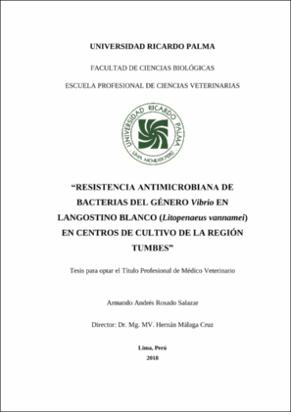Mostrar el registro sencillo del ítem
“Resistencia Antimicrobiana de bacterias del género Vibrio en langostino blanco (Litopenaeus vannamei) en centros de cultivo de la región Tumbes”
| dc.contributor.advisor | Málaga Cruz, Hernán | |
| dc.contributor.author | Rosado Salazar, Armando André | |
| dc.date.accessioned | 2019-02-20T17:49:41Z | |
| dc.date.available | 2019-02-20T17:49:41Z | |
| dc.date.issued | 2018 | |
| dc.identifier.uri | https://hdl.handle.net/20.500.14138/1686 | |
| dc.description.abstract | En la presente investigación, se identificó fenotípicamente la resistencia antimicrobiana hacia 5 antibióticos usados en acuicultura langostinera, por parte de especies del género Vibrio. El estudio fue del tipo transversal, descriptivo y observacional. Se colectaron 130 langostinos, procedentes de 17 centros de producción de la región Tumbes, identificándose 57 cepas mediante bioquímica presuntiva como Vibrio spp. Se realizaron dos pruebas bioquímicas para la diferenciación a nivel de especies: Fermentación de la Sacarosa y Halotolerancia, obteniéndose: 8 cepas de Vibrio cholerae, 3 cepas de V. mimicus, 11 cepas de V. harveyi, 8 cepas de V. vulnificus, 11 cepas de V. parahaemolyticus y 16 cepas de V. alginolyticus. En los antibiogramas realizados mediante la técnica placa-disco, Ampicilina fue el antibiótico que más resistencia presentaba (47%), seguido del Cloranfenicol (19%) y Tetraciclina (16%), mientras que Sulfametoxazol + Trimetoprim presentaba alta sensibilidad (95%) pero también resistencia (3%), además de Ciprofloxacino (93% de cepas sensibles) pero sin resistencia. Según el perfil de resistencia, Ampicilina fue el antibiótico que más monoresistencia presentó (16 cepas), y en cuanto a la resistencia múltiple, Ampicilina y Cloranfenicol presentaron 4 cepas con este perfil fenotípico. El estudio concluye que hay un bajo riesgo de desarrollo de resistencia antimicrobiana en la acuicultura langostinera, por parte de especies patógenas del género Vibrio, pero que debe de ser monitoreado epidemiológicamente, dado que se trata de antibióticos de amplio espectro. In the present investigation, antimicrobial resistance was identified phenotypically to 5 antibiotics used in shrimp aquaculture, by species of the genus Vibrio. The study was of the transversal, descriptive and observational type. 130 white shrimps were collected from 17 production centers in the Tumbes region, identifying 57 strains by presumptive biochemistry such as Vibrio spp. Two biochemical tests were carried out for differentiation at the species level: Fermentation of Sucrose and Halotolerance, obtaining: 8 strains of Vibrio cholerae, 3 strains of V. mimicus, 11 strains of V. harveyi, 8 strains of V. vulnificus, 11 strains of V. parahaemolyticus and 16 strains of V. alginolyticus. In the antibiograms performed using the plate-disc technique, Ampicillin was the antibiotic with the highest resistance (47%), followed by Chloramphenicol (19%) and Tetracycline (16%), while Sulfamethoxazole + Trimethoprim showed high sensitivity (95%). but also resistance (3%), in addition to Ciprofloxacin (93% of sensitive strains) but without resistance. According to the resistance profile, Ampicillin was the antibiotic that showed more monoresistance (16 strains), and in terms of multiple resistance, Ampicillin and Chloramphenicol presented 4 strains with this phenotypic profile. The study concludes that there is a low risk of development of antimicrobial resistance in shrimp aquaculture by pathogenic species of the genus Vibrio, but that it should be monitored periodically, given that it is broad-spectrum antibiotics. | es_ES |
| dc.description.sponsorship | Submitted by Wong Rafael (rafel_wl@hotmail.com) on 2019-02-20T17:49:41Z No. of bitstreams: 1 Rosado_a.pdf: 1618904 bytes, checksum: d735a1fa70d8f2f4e5aa83dfdb13d9dc (MD5) | es_ES |
| dc.description.sponsorship | Made available in DSpace on 2019-02-20T17:49:41Z (GMT). No. of bitstreams: 1 Rosado_a.pdf: 1618904 bytes, checksum: d735a1fa70d8f2f4e5aa83dfdb13d9dc (MD5) Previous issue date: 2018 | es_ES |
| dc.description.uri | Tesis | es_ES |
| dc.format | application/pdf | |
| dc.language.iso | spa | |
| dc.publisher | Universidad Ricardo Palma - URP | es_ES |
| dc.rights | info:eu-repo/semantics/openAccess | |
| dc.rights.uri | https://creativecommons.org/licenses/by-nc-nd/4.0/ | |
| dc.source | Repositorio Institucional - URP | es_ES |
| dc.subject | Langostino blanco | es_ES |
| dc.subject | Vibrio | es_ES |
| dc.subject | Tumbes | es_ES |
| dc.subject | Resistencia Antimicrobiana | es_ES |
| dc.subject | White shrimps | es_ES |
| dc.subject | Antimicrobial Resistance | es_ES |
| dc.title | “Resistencia Antimicrobiana de bacterias del género Vibrio en langostino blanco (Litopenaeus vannamei) en centros de cultivo de la región Tumbes” | es_ES |
| dc.type | info:eu-repo/semantics/bachelorThesis | |
| thesis.degree.discipline | Medicina Veterinaria | es_ES |
| thesis.degree.grantor | Universidad Ricardo Palma. Facultad de Ciencias Biológicas. Escuela Profesional de Ciencias Veterinarias | es_ES |
| thesis.degree.level | Título Profesional | es_ES |
| thesis.degree.name | Médico Veterinario | es_ES |
| dc.publisher.country | PE | es_ES |
| dc.subject.ocde | https://purl.org/pe-repo/ocde/ford#4.03.01 | |
| renati.advisor.orcid | https://orcid.org/0000-0001-9017-3025 | |
| renati.type | https://purl.org/pe-repo/renati/type#tesis | |
| renati.level | https://purl.org/pe-repo/renati/nivel#tituloProfesional | |
| renati.discipline | 841016 | |
| renati.juror | Ceino Gordillo, Franco Ernesto | |
| renati.juror | Leguía Puente, Guillermo Manuel | |
| renati.juror | León Córdova, Daphne Jhoanna | |
| dc.type.version | info:eu-repo/semantics/publishedVersion | |
| renati.author.dni | 46765199 | |
| renati.advisor.dni | 06454602 |
Ficheros en el ítem
Este ítem aparece en la(s) siguiente(s) colección(ones)
-
Medicina Veterinaria [83]


